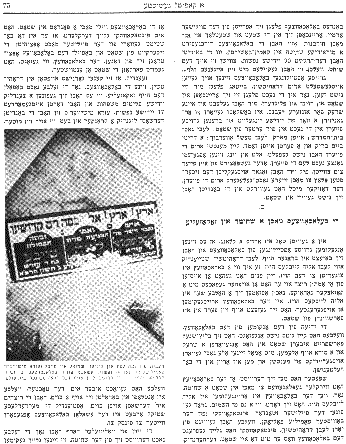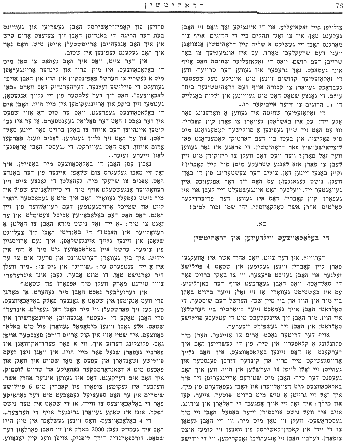
[
Page 75
]
Gangs of debtors broke away from the Polish army, sneaked into towns and cities
and started pillaging and looting: in Kamin-Kashirsk, the debtors carried out
frightful killings of 90 Jews, including the ritual slaughterer, who they
murdered with his own slaughtering knife.
Large sections of debtors
showed up around Drohitchin. We didn't see them during the day, but at night
they would sneak into town to loot and plunder. We were living in fear for our
lives. A group of young people decided to organize a unit to set large fires in
four areas of town: near the Street House of Study; in the market, near Meshel
Averbuch; a third was set near the bridge, and a fourth on the Sand. There were
plenty of around the fires; and both young and old sat near the fires, or
walked from one fire to the other. Many Jews chose their safest place to bed
down for the night near the fires. This technique was successful, and the gangs
didn't come into town.
T.
The debtors engage in slaughter in Zakazelia
One day there was a rumor that a large group of debtors was arriving; they
stopped at the Bronner courtyard near Drohitchin. While I was standing near
Eliyahu Leibka's house, I saw a debtor break into the house. He had the face of
a real killer, and stopped to pull out a Cossack whip. After waiting for a half
hour in Leibka's house, the debtor came out extremely angry, got on his horse
and left town.
The news of the arrival of the
debtor promised the worst, and the town was seized by fear. All streets were
empty of people, and everyone went into hiding. Later, we found out that the
debtor was intending to carry out a slaughter in Drohitchin when he arrived at
Leibka's house. Through some miracle, we located Pintakowski, the Polish
gendarme (of the famous Polish family that had lived in Drohitchin for years).
Pintakowski immediately asked the debtor what he was doing in town. Realizing
that the debtors wanted to carry out a pogrom in Drohitchin, Pintakowski told
him that Pintakowski was appointed by the Polish authorities to insure the
safety of the town, and ordered the debtor to get out of town. As mentioned,
the debtor was forced to leave.
[Photo:] The text of the
gravestone of three people who were killed on the 2nd of Cheshvan, 5681 [October 14, 1920] is:
Earth! Earth! Don't cover the blood of our martyrs.
[Right to left:] Honored and Honest Man, Yitzchak Shmuel, son of Ezra
His Mother, the Modest Leah, [rest obscured]
Her daughter, the Virgin, Toiba, daughter of Ezra
[Caption:] The gravestones of Leah Lev and her children, Shmuel and Toibel
(Ezra Mishiver's family), in addition to 14 other people slaughtered by the
debtors: 2 Cheshvan 5681, 1921 [This is an error, since the correct date is
above]. The victims are buried in the Drohitchin cemetery.
Since they weren't able to do
anything in Drohitchin, after that very night the debtors then attacked
Zakazelia, where they found a dozen Jewish refugee families, and killed 17
Jews. Ezra Mishiver's son was shot by the bandits while lying sick in bed. His
mother, who was taking care of him, was also killed. Her daughter, who escaped
and hid in a tree, was found and shot by the bandits. Having finished their
savage work, the group of debtors went on their way to Pinsk.
The Jews of the village of
Valivel heard about the massacre that very night, and immediately came

[
Page 76
]
to Zakazelia, but all that was left for them to do was recite psalms for the
victims. The next day they sent someone to inform the Jews of Drohitchin about
the dreadful murder. It's impossible to describe the effect the massacre in
Zakazelia had on us. It became even more sorrowful when the martyrs of
Zakazelia were brought to Drohitchin for burial in our cemetery a few days
later. All the Jews in town wept and wailed as they accompanied the 17 victims
to their eternal rest.
The Zakazelia massacre was a
warning to all Jews. A decision was made to go to Kobrin, where a Polish
commander and many policemen were stationed, to request the commander send
police protection to Drohitchin. The question was who ought to be the one to
make the trip. Who was going to take the risk to life and limb to make such a
long wagon trip to Kobrin? There weren't any trains at that time because the
tracks had been destroyed. There was one courageous person who was willing to
take the risk and travel to Kobrin – Aharon Asher Tolkovsky, may his
memory be blessed!
U.
The debtors pillage in Drohitchin
While Aharon Asher was on his
way to Kobrin, four Polish soldiers arrived in Drohitchin, and were looking for
a place to bake bread for the soldiers working on the rail lines. It was
decided that they would bake their bread in my house and that of my neighbor,
Hershel the Shoemaker. The soldiers also stayed in Hershel's house. We lived
together with those several Polish soldiers, and felt safer.
On the third night, around
midnight, we suddenly heard banging on the door. From the screaming I realized
that it was the debtors. I immediately instructed my wife and children to climb
out the window and go over to Hershel's house. When I opened the door, four
debtors barged in with revolvers and ordered me to set a table with bread,
butter eggs, cheese and milk, and to hand over dollars and jewelry. They warned
me that if I didn't do as I was told, they would do to me what they did to the
Jews in Kamin-Kashirsk where the debtors had just come from. They then started
imitating the way the Jewish women in Kamin-Kashirsk were screaming and crying
during the massacre. The bandits sat around the table, and I started placing
anything I could find in the house on the table.
While I was involved with the
debtors, my wife and children were calling out to Hershel Popinsky at his
house, and alerted the Polish soldiers. When they heard the word
"debtors," the oldest of the soldiers got dressed, grabbed his
revolver, and came into my house. The debtors asked him what he was doing here
so late at night. The Pole answered that he came to heat up the oven to bake
bread for his soldiers. He started to tinker around the oven, which got the
"guests" interested. After they finished eating, the debtors ordered
me to arrange beds for them to sleep in. Apparently to frighten me, one of the
gang pointed his revolver at me the whole time. I wasn't scared by the
diabolical behavior, and with total calm and a smile, I took the revolver from
his hand. This confused the debtor, who asked whether a Jew shouldn't be scared
to hold a revolver. The bandits went to sleep almost immediately. I started to
leave the room, and one of the debtors called me in Yiddish. I was taken aback
and asked him whether he was a Jew. He told me to be quiet and said that they
wouldn't harm me, but that they wanted me to give them two thousand marks, and
they would leave town.
That same night we heard that a
whole brigade of debtors was headed for Drohitchin, and would arrive the next
morning. You can imagine how we must have felt. In the morning, the new
"guests" started arriving in town. All the streets became filled with
debtors. I stood up and looked through the window onto the street, and noticed
a couple of horses and wagons passed quickly in front of my house. There were
six Polish gendarmes. One of them stood up in the wagon and waved around a
whip, shouting cheerfully. I recognized them, it was our own Aharon Asher, who
was returning to Drohitchin with six Polish guards. He intentionally pulled out
the whip to show the debtors that the town was no longer out of control. We
began to feel much better.
I had to give the four debtors
who slept in my house 2000 marks, and they left town. They passed through
Lipnik on the way to Yanovo,
JewishGen, Inc. makes no representations regarding the accuracy of
the translation. The reader may wish to refer to the original material
for verification.
JewishGen is not responsible for inaccuracies or omissions in the original work and cannot rewrite or edit the text to correct inaccuracies and/or omissions.
Our mission is to produce a translation of the original work and we cannot verify the accuracy of statements or alter facts cited.
 Drogichin, Belarus
Drogichin, Belarus
 Yizkor Book Project
Yizkor Book Project
 JewishGen Home Page
JewishGen Home Page
Copyright © 1999-2024 by JewishGen, Inc.
Updated 10 Dec 2001 by LA